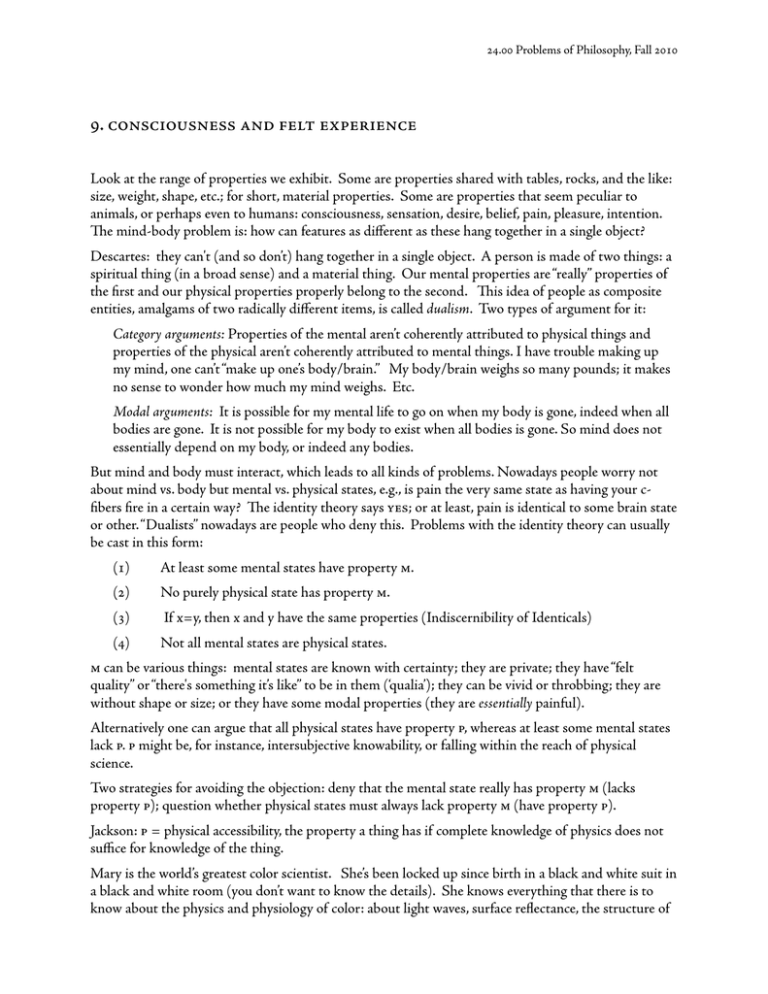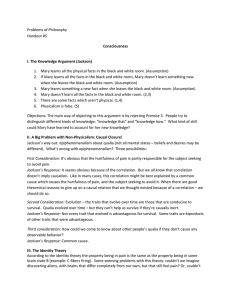Document 13519355
advertisement

. Problems of Philosophy, Fall . Look at the range of properties we exhibit. Some are properties shared with tables, rocks, and the like: size, weight, shape, etc.; for short, material properties. Some are properties that seem peculiar to animals, or perhaps even to humans: consciousness, sensation, desire, belief, pain, pleasure, intention. e mind-body problem is: how can features as different as these hang together in a single object? Descartes: they can't (and so don’t) hang together in a single object. A person is made of two things: a spiritual thing (in a broad sense) and a material thing. Our mental properties are “really” properties of the first and our physical properties properly belong to the second. is idea of people as composite entities, amalgams of two radically different items, is called dualism. Two types of argument for it: Category arguments: Properties of the mental aren’t coherently attributed to physical things and properties of the physical aren’t coherently attributed to mental things. I have trouble making up my mind, one can’t “make up one’s body/brain.” My body/brain weighs so many pounds; it makes no sense to wonder how much my mind weighs. Etc. Modal arguments: It is possible for my mental life to go on when my body is gone, indeed when all bodies are gone. It is not possible for my body to exist when all bodies is gone. So mind does not essentially depend on my body, or indeed any bodies. But mind and body must interact, which leads to all kinds of problems. Nowadays people worry not about mind vs. body but mental vs. physical states, e.g., is pain the very same state as having your cfibers fire in a certain way? e identity theory says ; or at least, pain is identical to some brain state or other.“Dualists” nowadays are people who deny this. Problems with the identity theory can usually be cast in this form: () At least some mental states have property . () No purely physical state has property . () If x=y, then x and y have the same properties (Indiscernibility of Identicals) () Not all mental states are physical states. can be various things: mental states are known with certainty; they are private; they have “felt quality” or “there's something it’s like” to be in them (‘qualia’); they can be vivid or throbbing; they are without shape or size; or they have some modal properties (they are essentially painful). Alternatively one can argue that all physical states have property , whereas at least some mental states lack . might be, for instance, intersubjective knowability, or falling within the reach of physical science. Two strategies for avoiding the objection: deny that the mental state really has property (lacks property ); question whether physical states must always lack property (have property ). Jackson: = physical accessibility, the property a thing has if complete knowledge of physics does not suffice for knowledge of the thing. Mary is the world’s greatest color scientist. She’s been locked up since birth in a black and white suit in a black and white room (you don’t want to know the details). She knows everything that there is to know about the physics and physiology of color: about light waves, surface reflectance, the structure of . Problems of Philosophy, Fall the eye, and what goes on in normal brains when people look at a ripe lemon. But she’s never had the experience herself. On her th birthday, she is allowed to leave the room. She sets her eyes on a ripe lemon, and has the experience of yellow. Surely she has learned something at this point, what it is like to see yellow! is gives us the following argument against the identity theory: () Before her release, Mary knows all the physical facts. [] () en Mary learns a new fact: what yellow experience is like. [] () Facts about what experience is like are not physical facts. [,] Suppose Jackson is right. en we have a problem. e physical is a causally closed realm. Physical effects (like grimacing) have physical causes. If pain isn’t physical, then it’s not being in pain that makes us grimace (or write articles like Jackson’s); it’s something physical that’s associated with being in pain. Similarly, it’s not having yellow experiences that caused Jackson to write his paper, or to insist that yellow experiences aren’t reducible to material things; he’d be doing that even if there were no irreducible experiences. at’s called epiphenomenalism. Is it believable? Jackson thinks so. Others would turn the argument around; epiphenomenalism is nuts, so we’d better go with the identity theory (Carruthers). Two main ways to oppose the argument: attack () or (). Is it really true that Mary knows all the physical facts before her release? It is hard to see what would prevent it. But consider the second premise. Is it so clear that Mary learns a new fact on emerging from the room? Perhaps she encounters an old fact, a purely physical fact, but conceives that fact in a new manner. Story of Oedipus and Jocasta. Moral: the same object or fact can be understood in different ways (same reference, different sense). e fact that Oedipus is married to (pointing at a certain woman) can be conceived either as his being married to Jocasta—the name he knows her by—or as his being married to Mom—the name he knows his mother by. e fact conceived is the same in both cases. It better be or we could argue Jackson-style that Jocasta ≠ Mom, which we know is not the case. Let’s apply this to black and white Mary. Before leaving the room, she knows all the physical facts, including the following: When I look at a ripe lemon, I go into physical state . On emerging from the room, she supposedly learns a new fact: When I look at a ripe lemon, I go into mental state , where Y is the experience of yellowness. Why can’t the identity theorist reply as follows: = ; the new fact = the old. What Mary has learned is new way of conceptualizing the fact. Now she conceives of the reaction “from the inside” as it were. is is not to acquire new information. It’s at most to acquire a new ability, the ability to conceive the old information the way other people do. e distinction between a fact and ways of conceiving it might be relevant to the first premise too. We said it was hard to see what could prevent Mary from knowing all the physical facts while still locked up in the black and white room. If there are facts that can be conceived by creatures like us in two ways, perhaps there are some that we can conceive only in way. Perhaps state , although fully physical, has no finite representation in third-person physical terms. e only way Mary can access it is perceptually or introspectively. Or perhaps it isn’t a fact that Mary gets at all. Perhaps it is an ability: an ability to recognize yellow things just by looking at them. MIT OpenCourseWare http://ocw.mit.edu 24.00 Problems in Philosophy Fall 2010 For information about citing these materials or our Terms of Use, visit: http://ocw.mit.edu/terms.



